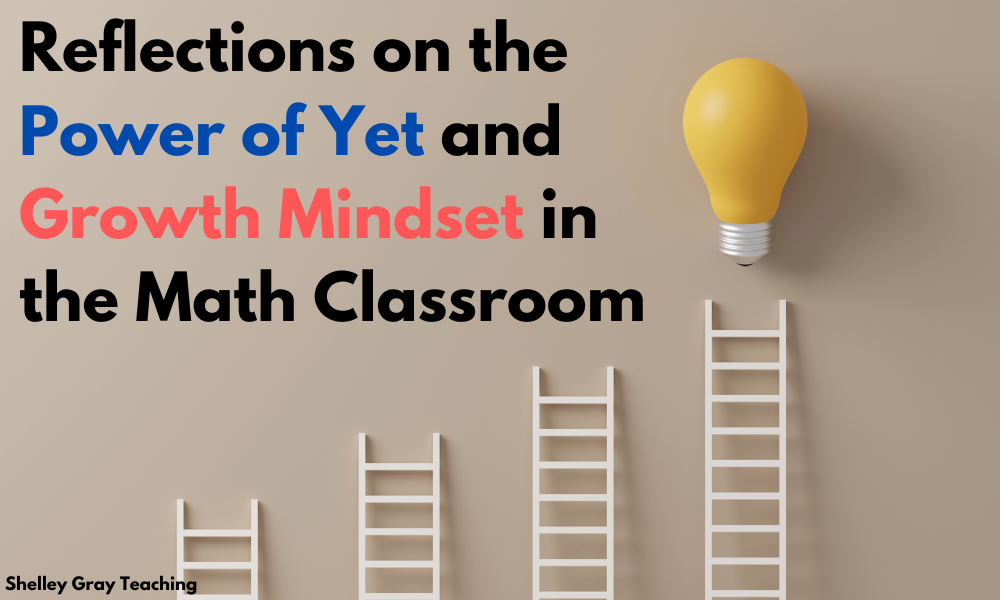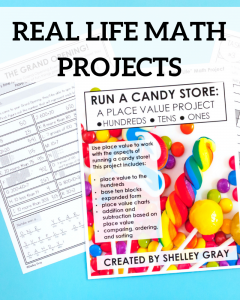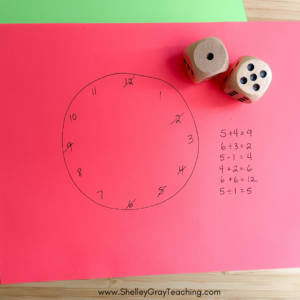
“I am not good at math.”
“ I’m not a math person.”
“I am missing the math gene.”
“I don’t have a math brain.”
“Math is just hard for me.”
How many of these have you heard from students? These are all fixed mindset statements.
A fixed mindset is a belief that a person has a predetermined amount of intelligence, skills, or talents. Alternatively, a growth mindset is a belief that a person’s intelligence and/or talents can be grown or developed with persistence, effort, and a focus on learning.
Children in kindergarten are all about the growth mindset. They will keep trying and struggling to do something, just because they can. Usually somewhere around third grade children start thinking they can’t, or things are just too hard. They begin to think of themselves as either smart or not smart (I refuse to use the ‘s’ word).
This guest blog post is written by Pam LeSeure. See more from Pam about Guided Math Conferences HERE and the power of Guided Math HERE.
A growth mindset is important to all aspects of the classroom, but today we’ll focus on the math classroom. I begin the school year by asking students how they feel about themselves as mathematicians. Most say they are not mathematicians. That’s the first thing I squash like a bug. We are ALL mathematicians, scientists, revolutionaries…you get the idea.
As soon as I hear the fixed mindset comments about themselves I start repeating the word “yet.”
“I just don’t understand fractions…yet.”
“I can’t multiply…yet.”
“I don’t know my basic facts…yet.”
Then I read the book The Power of Yet. I even made a shirt that says it in case they think I am joking.

We post the idea of “yet” all around the room and refer to it often. But that isn’t enough to get them to buy into the idea that there is value in struggle and that mistakes are okay.
There is another saying that doesn’t always have the positive effect we want: “Mistakes are proof we are learning.” I can’t remember one student that didn’t roll their eyes when I would say that…until I started really living the growth mindset life.
There is real brain evidence that says teaching students that their work needs to be correct every time is detrimental. Instead, we should be teaching them to take risks, struggle, and fail.
We can use real-life problems to foster this. Here’s an example from my own experience.
Each Wednesday my daughter and I would stop at Starbucks on our way to school. One day the kids asked how much money I was spending on “just coffee” each week. So I asked the class to calculate how much I was spending. A couple of the quicker students asked what each coffee cost and how many times I stopped. Simple multiplication. Easy enough. These students were all about speed.
But the belief that the “smart” students get the answer the fastest is a fixed mindset.
Depth is so much more important.
Then a student asked if we always got the same size. This was a great question that proved deeper thinking…and yes we both always got Ventis.
The next question was if we only stop on Wednesdays. Yes, we only stopped on the Wednesdays that we had school.
Light bulb!
Someone asked for a calendar. The next person asked if we only got coffee each week or did we add a treat. Someone asked if the prices had changed at all. This simple comment on my coffee spending habits continued for the entire math block. I never considered stopping them or telling them we would have to pick this back up the next day.
This is a prime example of a growth mindset. These students never said, “This is getting too hard,” or “There is no way we can figure this out.” They kept going. The struggle and perseverance they showed that day was simply amazing. My only regret was I didn’t have a camera rolling to get a video.
Related: 5 Steps to Teaching Growth Mindset in Math Class
Another day, a fifth-grade student decided that he was going to create a new strategy for 3 by 2 multiplication. He was a student that typically understood things easily and figured this would be a simple task. Each day he would come to me with a different idea. Each time his strategy would fail. Although he was frustrated, he never gave up. This struggle was real, for sure. Finally, after many attempts, he said he didn’t think he could create an original idea. I asked him if he was giving up. He knew that I didn’t tolerate giving up, so he said, “NO! Never. For now, I am going to stick with what we have, but eventually, I will discover a new strategy and will come to teach it to your students. I just hope you haven’t retired by then.”
It is so important to foster this growth mindset in our students. But how?
- We can become flexible in our teaching. The Starbucks coffee lesson was not in the lesson plan. But it proved to be so much more than just about the coffee. It allowed students to persevere and use math in a way that was relevant to their real-life experience.
- We can “notice” when students are using a growth mindset, and point it out to them. For example, if you see a student struggling but still working hard, you might say, “I have noticed that you never gave up on that activity, even though you faced some challenges.”
- We can be good role models. As teachers, it’s important for us to model a growth mindset too. We can show students that we are learning too, right along with them. We can talk about our struggles and how we’ve overcome them.
The ability to persevere as a child will ultimately lead to the ability to persevere in life as an adult. Let’s give kids as many opportunities to do this as we can!







